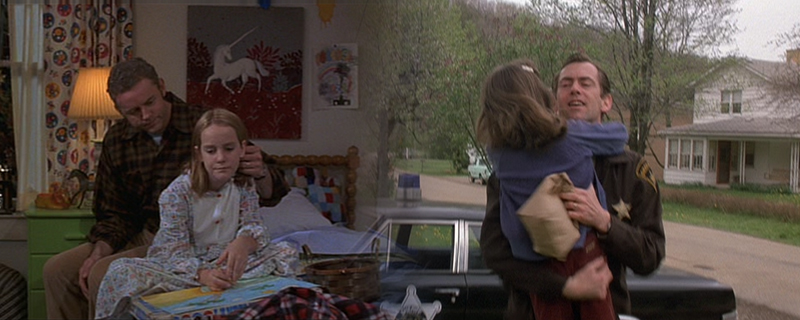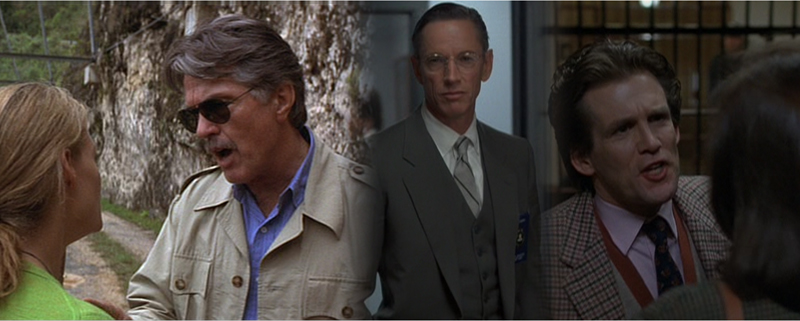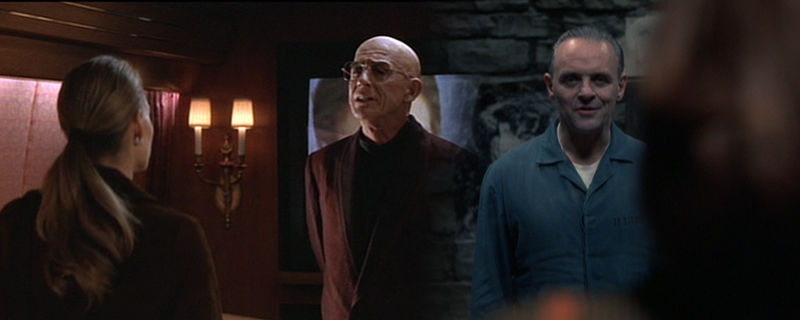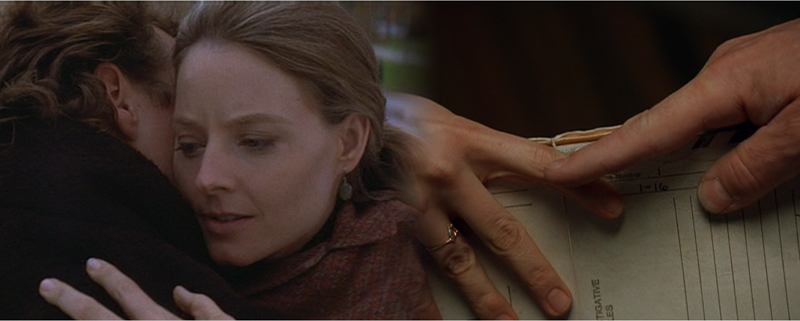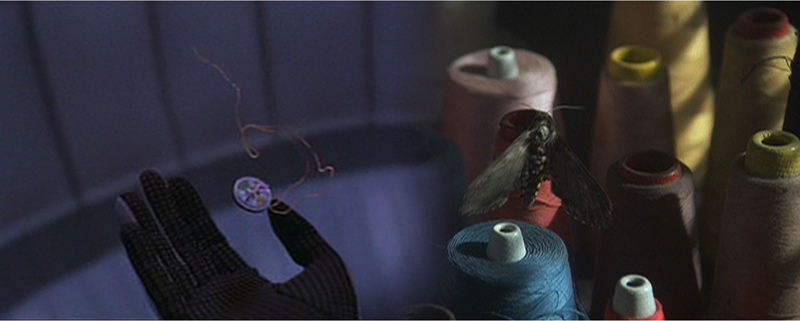Contact and The Silence of the Lambs: Parallel Stories
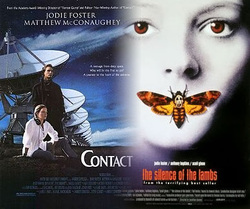
Contact and The Silence of the Lambs are two of my favorite films, and I've watched both many times.
While the subject matter couldn't be more different, their plot points are curiously resonant. I don't claim this is anything more than coincidence, but it's fun to compare the two movies and find common elements.
Spoiler alert! If you haven't seen both of these movies, don't read any further.
While the subject matter couldn't be more different, their plot points are curiously resonant. I don't claim this is anything more than coincidence, but it's fun to compare the two movies and find common elements.
Spoiler alert! If you haven't seen both of these movies, don't read any further.
The protagonists: Ellie and Clarice
The most obvious comparison is that Jodie Foster stars in both films. However, the characters she plays—Ellie Arroway of Contact and Clarice Starling from Lambs—are quite similar in personality: solitary, haunted, driven, intelligent, and emotionally fragile.
The names Ellie (link) and Clarice (link) both mean "shines brightly".
Their backstories are similar too. Both grow up in rural settings and are raised by loving, widowed blue-collar fathers who inspire their daughters' career choice by example.
Ellie's dad stargazes with her and encourages an interest in science and ham radios; she becomes a bright, driven radio astronomer.
Clarice's dad is a town marshal, and she follows his footsteps by training for a career with the FBI.
The most obvious comparison is that Jodie Foster stars in both films. However, the characters she plays—Ellie Arroway of Contact and Clarice Starling from Lambs—are quite similar in personality: solitary, haunted, driven, intelligent, and emotionally fragile.
The names Ellie (link) and Clarice (link) both mean "shines brightly".
Their backstories are similar too. Both grow up in rural settings and are raised by loving, widowed blue-collar fathers who inspire their daughters' career choice by example.
Ellie's dad stargazes with her and encourages an interest in science and ham radios; she becomes a bright, driven radio astronomer.
Clarice's dad is a town marshal, and she follows his footsteps by training for a career with the FBI.
Fig 1. - Ellie (left), Clarice (right), and their fathers.
Orphans
The two girls are tragically orphaned at a young age. The loss of their father, coupled with related feelings of guilt, abandonment, and injustice give them an almost fanatical devotion to their work.
Ellie unfairly blames herself for fetching Dad's heart medicine too late. Her work in astronomy reflects her hunger to find something she can rely on, connect with, believe in.
Clarice's father is killed by thieves caught unawares, and she is sent to live with her mother's cousin on a sheep ranch in another state. Her failure to save even a single lamb from an annual slaughter haunts her nightmares, and informs her desire to catch deranged killers.
Orphans
The two girls are tragically orphaned at a young age. The loss of their father, coupled with related feelings of guilt, abandonment, and injustice give them an almost fanatical devotion to their work.
Ellie unfairly blames herself for fetching Dad's heart medicine too late. Her work in astronomy reflects her hunger to find something she can rely on, connect with, believe in.
Clarice's father is killed by thieves caught unawares, and she is sent to live with her mother's cousin on a sheep ranch in another state. Her failure to save even a single lamb from an annual slaughter haunts her nightmares, and informs her desire to catch deranged killers.
Detectives
Ellie and Clarice choose highly technical investigatory jobs with niche, quixotic specializations. They are both detectives of a sort, sniffing out clues on lonely watches, learning to think like their quarry, and suffering the disrespect of their more successful mainstream peers.
Ellie champions the cause of SETI, the Search for Extra-Terrestrial Intelligence; an apparently futile endeavor seen by many as a dead-end career.
Clarice wants to work in criminal psychology, despite the fact that it will lead her into the darkest corners of the human mind. As a pretty, diminutive trainee she is often ogled, exploited, and treated dismissively, but she swallows her pride and does whatever the search demands.
Ellie and Clarice choose highly technical investigatory jobs with niche, quixotic specializations. They are both detectives of a sort, sniffing out clues on lonely watches, learning to think like their quarry, and suffering the disrespect of their more successful mainstream peers.
Ellie champions the cause of SETI, the Search for Extra-Terrestrial Intelligence; an apparently futile endeavor seen by many as a dead-end career.
Clarice wants to work in criminal psychology, despite the fact that it will lead her into the darkest corners of the human mind. As a pretty, diminutive trainee she is often ogled, exploited, and treated dismissively, but she swallows her pride and does whatever the search demands.
Double-crossing bosses
Both women work for older male superiors in government jobs who take advantage of them.
Ellie's boss is self-serving National Science Foundation Director David Drumlin (Tom Skerritt). Their relationship is entirely adversarial, as he considers the SETI program a waste of time and cuts her funding at the first opportunity. When she perseveres and proves him wrong, however, he's only too happy to worm back into the limelight without giving Ellie proper credit. He later stabs her in the back during the hearings which will decide who rides in the Machine.
Clarice's boss, Special Agent Jack Crawford (Scott Glenn), is far more supportive and sympathetic than Drumlin, though he does use her as naïve, attractive bait to gain Lecter's—and others'—cooperation.
But Clarice finds plenty of antagonism in the slimy Dr. Chilton (Anthony Heald), whom she must placate in order to gain access to Hannibal Lecter in prison. Chilton actively undermines and usurps Clarice's efforts, making him very much like Ellie's Dr. Drumlin. Later he, too, stabs Clarice in the back by arranging his own between Lecter and the latest victim's mother, Senator Ruth Martin (Diane Baker).
Eventually Drumlin and Chilton both die for their betrayals.
Both women work for older male superiors in government jobs who take advantage of them.
Ellie's boss is self-serving National Science Foundation Director David Drumlin (Tom Skerritt). Their relationship is entirely adversarial, as he considers the SETI program a waste of time and cuts her funding at the first opportunity. When she perseveres and proves him wrong, however, he's only too happy to worm back into the limelight without giving Ellie proper credit. He later stabs her in the back during the hearings which will decide who rides in the Machine.
Clarice's boss, Special Agent Jack Crawford (Scott Glenn), is far more supportive and sympathetic than Drumlin, though he does use her as naïve, attractive bait to gain Lecter's—and others'—cooperation.
But Clarice finds plenty of antagonism in the slimy Dr. Chilton (Anthony Heald), whom she must placate in order to gain access to Hannibal Lecter in prison. Chilton actively undermines and usurps Clarice's efforts, making him very much like Ellie's Dr. Drumlin. Later he, too, stabs Clarice in the back by arranging his own between Lecter and the latest victim's mother, Senator Ruth Martin (Diane Baker).
Eventually Drumlin and Chilton both die for their betrayals.
Fig 2. - Ellie and Drumlin (left), Crawford (middle), Chilton and Clarice (right)
Breakthrough in an unsolved mystery
Each movie begins with an unsolved mystery, a stalled search for an elusive Other. Is there intelligent life out there trying to contact us? Who is Buffalo Bill, the killer who kidnaps women for their skins? The first real breakthrough in both cases occurs when Jodie Foster's character goes the extra mile in pursuit of her goal.
When Drumlin cuts her funding, Ellie spends a year desperately seeking corporate sponsorship. Her impassioned last-ditch plea to Hadden Industries wins her the necessary funds. Then, rather than sitting in a comfortable office while trusting the search to computers, she sits outside in the shadow of the telescopes, listening for the signal with her own ears. Just when her time and money are gone, she hits paydirt.
Clarice's contact with Hannibal Lecter goes nowhere until she speaks frankly and opens up to him, against Crawford's direct orders. Lecter rewards Clarice by implying he knows the killer's identity, which he won't divulge. Rather, he offers clues in exchange for further details about her difficult childhood.
Breakthrough in an unsolved mystery
Each movie begins with an unsolved mystery, a stalled search for an elusive Other. Is there intelligent life out there trying to contact us? Who is Buffalo Bill, the killer who kidnaps women for their skins? The first real breakthrough in both cases occurs when Jodie Foster's character goes the extra mile in pursuit of her goal.
When Drumlin cuts her funding, Ellie spends a year desperately seeking corporate sponsorship. Her impassioned last-ditch plea to Hadden Industries wins her the necessary funds. Then, rather than sitting in a comfortable office while trusting the search to computers, she sits outside in the shadow of the telescopes, listening for the signal with her own ears. Just when her time and money are gone, she hits paydirt.
Clarice's contact with Hannibal Lecter goes nowhere until she speaks frankly and opens up to him, against Crawford's direct orders. Lecter rewards Clarice by implying he knows the killer's identity, which he won't divulge. Rather, he offers clues in exchange for further details about her difficult childhood.
A dangerous mentor with ulterior motives
In both movies the protagonist is helped by a brilliant, reclusive mentor. They possess an uncanny ability to peer within her past, her soul, and offer aid out of a genuine fondness for her, but also with selfish motives in mind. The mentors are ruthless men, dangerous and powerful in different ways, and bound by a strange but binding personal code of ethics.
Ellie's fiery eleventh-hour appeal to the Hadden Corporation puts her in the sights of its owner, S. R. Hadden (John Hurt). He's a ruthless multibillionaire who lives high above the mortal world in a perpetually flying personal jet. At their first face-to-face meeting, Hadden recites her entire life history, showing that he'd done his homework before deciding to fund her project. He genuinely likes Ellie, but admits to an ulterior motive. “I know a good bet when I see one,” he says, knowing her success could be a global game-changer. He also enjoys throwing monkey wrenches into the system, especially if he stands to profit from it.
In contrast to Hadden, Hannibal “the Cannibal” Lecter (Anthony Hopkins) has been locked in a subterranean top security prison cell for a decade. Like a Las Vegas mentalist he is able to guess much of her past and what motivates her. He feasts upon Clarice's insecurities (a backwoods girl trying to overcome her past and make it in the Big City), her fragile bravery and disarming honesty. He savors each new revelation about her unhappy past and responds with clues she must solve to learn Buffalo Bill's identity. Like Hadden, Lecter sees in Clarice a way to change his game, with new opportunities for escape.
In both movies the protagonist is helped by a brilliant, reclusive mentor. They possess an uncanny ability to peer within her past, her soul, and offer aid out of a genuine fondness for her, but also with selfish motives in mind. The mentors are ruthless men, dangerous and powerful in different ways, and bound by a strange but binding personal code of ethics.
Ellie's fiery eleventh-hour appeal to the Hadden Corporation puts her in the sights of its owner, S. R. Hadden (John Hurt). He's a ruthless multibillionaire who lives high above the mortal world in a perpetually flying personal jet. At their first face-to-face meeting, Hadden recites her entire life history, showing that he'd done his homework before deciding to fund her project. He genuinely likes Ellie, but admits to an ulterior motive. “I know a good bet when I see one,” he says, knowing her success could be a global game-changer. He also enjoys throwing monkey wrenches into the system, especially if he stands to profit from it.
In contrast to Hadden, Hannibal “the Cannibal” Lecter (Anthony Hopkins) has been locked in a subterranean top security prison cell for a decade. Like a Las Vegas mentalist he is able to guess much of her past and what motivates her. He feasts upon Clarice's insecurities (a backwoods girl trying to overcome her past and make it in the Big City), her fragile bravery and disarming honesty. He savors each new revelation about her unhappy past and responds with clues she must solve to learn Buffalo Bill's identity. Like Hadden, Lecter sees in Clarice a way to change his game, with new opportunities for escape.
Fig.3 - Ellie and Hadden (left), Lecter and Clarice (right).
A cipher hidden in a link to the past
The first real clue comes encrypted in an unpleasant historical context.
In Contact, the signal from space is a simple count of prime numbers. But the harmonically rich numeric pulses contain embedded video frames of Hitler opening the 1936 Summer Olympics in Berlin. It is quickly decided the senders simply replayed our first television transmission back to us; the fact that it's Hitler is only coincidence. But buried within that video is a further layer of information: countless pages of indecipherable symbols whose arrangement is also an enigma.
In The Silence of the Lambs, Hannibal Lecter guides Clarice to a self-storage locker in which he kept, ten years earlier, the preserved head of a former patient. Lecter suggests Buffalo Bill was the killer, and that the rare moth pupa found in the head's mouth is Bill's doing. Still a mystery, but it's a break, and a solid lead for Clarice to investigate.
A cipher hidden in a link to the past
The first real clue comes encrypted in an unpleasant historical context.
In Contact, the signal from space is a simple count of prime numbers. But the harmonically rich numeric pulses contain embedded video frames of Hitler opening the 1936 Summer Olympics in Berlin. It is quickly decided the senders simply replayed our first television transmission back to us; the fact that it's Hitler is only coincidence. But buried within that video is a further layer of information: countless pages of indecipherable symbols whose arrangement is also an enigma.
In The Silence of the Lambs, Hannibal Lecter guides Clarice to a self-storage locker in which he kept, ten years earlier, the preserved head of a former patient. Lecter suggests Buffalo Bill was the killer, and that the rare moth pupa found in the head's mouth is Bill's doing. Still a mystery, but it's a break, and a solid lead for Clarice to investigate.
Romance
In Contact Ellie becomes romantically involved with religious philosopher Palmer Joss (Matthew McConaughey). The "romance" in The Silence of the Lambs is of a subtler nature, the bizarre yet psychologically intimate relationship Clarice develops with Lecter. In each case the male partner is a polar opposite: religion versus science, and violent sociopath versus law and order. Both relationships are marked by Ellie/Clarice's emotional distance and an on-again, off-again nature.
In Contact Ellie becomes romantically involved with religious philosopher Palmer Joss (Matthew McConaughey). The "romance" in The Silence of the Lambs is of a subtler nature, the bizarre yet psychologically intimate relationship Clarice develops with Lecter. In each case the male partner is a polar opposite: religion versus science, and violent sociopath versus law and order. Both relationships are marked by Ellie/Clarice's emotional distance and an on-again, off-again nature.
Fig. 4 - Palmer Joss and Ellie (left), Clarice and Lecter (right).
The mentor's trump card
Just when she is about to be squeezed out of the action by her double-crossing superiors, the mentor gives his protege a final clue that keeps her in play. This is the last time she sees him.
in Contact, Hadden lands to meet Ellie in person, and gives her the key he's found which makes it possible to read the information contained in the signal from space.
Lecter's hints, and hand-written notes he slips into Clarice's case file, point her to the location of the killer.
The mentor's trump card
Just when she is about to be squeezed out of the action by her double-crossing superiors, the mentor gives his protege a final clue that keeps her in play. This is the last time she sees him.
in Contact, Hadden lands to meet Ellie in person, and gives her the key he's found which makes it possible to read the information contained in the signal from space.
Lecter's hints, and hand-written notes he slips into Clarice's case file, point her to the location of the killer.
A false trail, a new chance
Just when it seems Ellie and Clarice have been left behind, their determination is rewarded by a new opportunity while their competitors are led down a false trail.
Drumlin is killed when the Machine is sabotaged by a fanatic, and it seems the Machine project is over until Hadden reveals he's built a backup Machine in secret, and offers Ellie the chance to ride it.
The information Chilton and Crawford each obtain regarding Buffalo Bill's whereabouts turns out to be false. Just when it seems Crawford is about to catch Jame Gumb, Clarice is still in the first victim's hometown, knocking on the door of the girl's former employer. What she doesn't know is that Gumb himself now lives there.
Just when it seems Ellie and Clarice have been left behind, their determination is rewarded by a new opportunity while their competitors are led down a false trail.
Drumlin is killed when the Machine is sabotaged by a fanatic, and it seems the Machine project is over until Hadden reveals he's built a backup Machine in secret, and offers Ellie the chance to ride it.
The information Chilton and Crawford each obtain regarding Buffalo Bill's whereabouts turns out to be false. Just when it seems Crawford is about to catch Jame Gumb, Clarice is still in the first victim's hometown, knocking on the door of the girl's former employer. What she doesn't know is that Gumb himself now lives there.
Unseen danger, a familiar floating sign
At the moment the two women unwittingly reach a moment of extreme peril, a familiar sign appears to alert them to danger and guide them to safety.
Ellie's increasingly violent ride in the Machine is revealed as a consequence of the chair she's strapped to when Palmer Joss's toy compass slips from a pocket and floats serenely before her. The chair was not in the original plans, and its presence is the cause of a dangerous instability. She escapes death by freeing herself from the chair just before it snaps off and slams against the side of the compartment. The compass is a recurring symbol of love, trust, and finding one's way.
When a Death's Head moth flutters into view, Clarice realizes she is standing in the killer's house, four paces from Jame Gumb, the very man she seeks. She's seen their pupae several times before, jammed down the throats of his victims as a personal symbol of the transformation he covets. But the skull-shaped coloration on the moth's back is also a perfect symbol of the danger which threatens Clarice.
At the moment the two women unwittingly reach a moment of extreme peril, a familiar sign appears to alert them to danger and guide them to safety.
Ellie's increasingly violent ride in the Machine is revealed as a consequence of the chair she's strapped to when Palmer Joss's toy compass slips from a pocket and floats serenely before her. The chair was not in the original plans, and its presence is the cause of a dangerous instability. She escapes death by freeing herself from the chair just before it snaps off and slams against the side of the compartment. The compass is a recurring symbol of love, trust, and finding one's way.
When a Death's Head moth flutters into view, Clarice realizes she is standing in the killer's house, four paces from Jame Gumb, the very man she seeks. She's seen their pupae several times before, jammed down the throats of his victims as a personal symbol of the transformation he covets. But the skull-shaped coloration on the moth's back is also a perfect symbol of the danger which threatens Clarice.
Fig 5. - Palmer Joss's toy compass (left), Jame Gumb's Death's Head moth (right).
The mentor passes after a final call from a distant location
In the end, both mentors fly to a faraway location after their final meeting. Hadden goes to the Mir space station where weightlessness fends off the worst effects of his terminal cancer. Lecter makes a successful escape and flees to the Caribbean in pursuit of Chilton, whom he kills. They each make a long-distance telephone call to their protégé before passing out of her life forever.
Father's approval, delivered by proxy
When Ellie rides the Machine to its final destination, she is met by an alien who adopts the likeness and demeanor of her late father. The being imparts a message of warm welcome, of parental pride in her accomplishments, and a promise that none of us is ever truly alone. She returns to Earth a changed woman, after having found the very thing she yearned for all the years of her search.
At her graduation, Crawford tells Clarice that her father would be proud of her (for graduating, and catching Gumb). It's clear this means everything to her, and the nightmares that haunted her since childhood have been quelled.
Notes from Readers
I received an email from a reader who identified yet another coincidence. Here are his exact words:
"There is one more notable coincidence: the blind technical gurus who assist the heroine in her investigation. In Contact it's William Fichtner as SETI investigator Kent Clark, and in SOTL it's Paul Lazar as entomologist Dr. Pilcher. Minor but memorable characters and yet another parallel."
Another reader, Sean, wrote:
"Hey Sandra! I read your piece on Contact/Silence of the Lambs. Great stuff! I noticed a couple more parallels. Those which actually made me search the web for similarities and brought me here.
The opening scene of Contact starts with Ellie saying "CQ". Those letters are radio shorthand for "SEEK YOU". I found that immediately interesting in that Hannibal says to Starling "Look deep inside yourself" in Silence of the Lambs. And, as we know, ironically, Contact is truly about an internal journey. Faith.
But, the most interesting parallel, and I think it's absolutely intentional. As Ellie's father is dying and she's running up the stairs to get the medicine, the music changes. My ears immediately perked up as I've been watching Silence of the Lambs a bit lately. The music is EXTREMELY reminiscent of Silence of the Lambs on literally every level. I can't imagine it's just a coincidence. Now, I'm a classically trained musician. So, I recognize that an audience full of laymen wouldn't likely notice consciously. But, subliminally, they absolutely would feel uncomfortable at that moment if they had seen the other movie even if they weren't aware of why.
Just thought you might find these parallels I found interesting."
The mentor passes after a final call from a distant location
In the end, both mentors fly to a faraway location after their final meeting. Hadden goes to the Mir space station where weightlessness fends off the worst effects of his terminal cancer. Lecter makes a successful escape and flees to the Caribbean in pursuit of Chilton, whom he kills. They each make a long-distance telephone call to their protégé before passing out of her life forever.
Father's approval, delivered by proxy
When Ellie rides the Machine to its final destination, she is met by an alien who adopts the likeness and demeanor of her late father. The being imparts a message of warm welcome, of parental pride in her accomplishments, and a promise that none of us is ever truly alone. She returns to Earth a changed woman, after having found the very thing she yearned for all the years of her search.
At her graduation, Crawford tells Clarice that her father would be proud of her (for graduating, and catching Gumb). It's clear this means everything to her, and the nightmares that haunted her since childhood have been quelled.
Notes from Readers
I received an email from a reader who identified yet another coincidence. Here are his exact words:
"There is one more notable coincidence: the blind technical gurus who assist the heroine in her investigation. In Contact it's William Fichtner as SETI investigator Kent Clark, and in SOTL it's Paul Lazar as entomologist Dr. Pilcher. Minor but memorable characters and yet another parallel."
Another reader, Sean, wrote:
"Hey Sandra! I read your piece on Contact/Silence of the Lambs. Great stuff! I noticed a couple more parallels. Those which actually made me search the web for similarities and brought me here.
The opening scene of Contact starts with Ellie saying "CQ". Those letters are radio shorthand for "SEEK YOU". I found that immediately interesting in that Hannibal says to Starling "Look deep inside yourself" in Silence of the Lambs. And, as we know, ironically, Contact is truly about an internal journey. Faith.
But, the most interesting parallel, and I think it's absolutely intentional. As Ellie's father is dying and she's running up the stairs to get the medicine, the music changes. My ears immediately perked up as I've been watching Silence of the Lambs a bit lately. The music is EXTREMELY reminiscent of Silence of the Lambs on literally every level. I can't imagine it's just a coincidence. Now, I'm a classically trained musician. So, I recognize that an audience full of laymen wouldn't likely notice consciously. But, subliminally, they absolutely would feel uncomfortable at that moment if they had seen the other movie even if they weren't aware of why.
Just thought you might find these parallels I found interesting."
